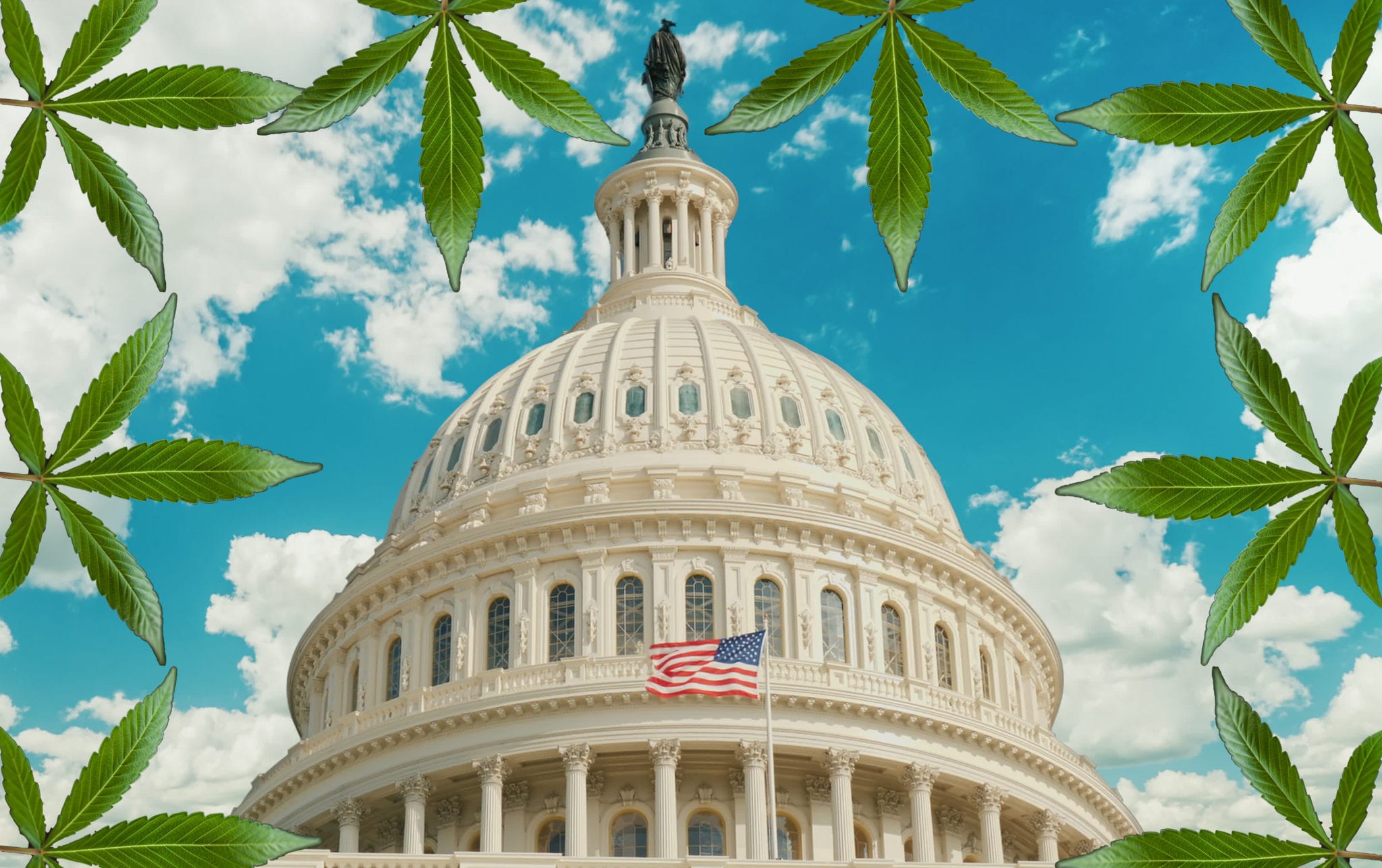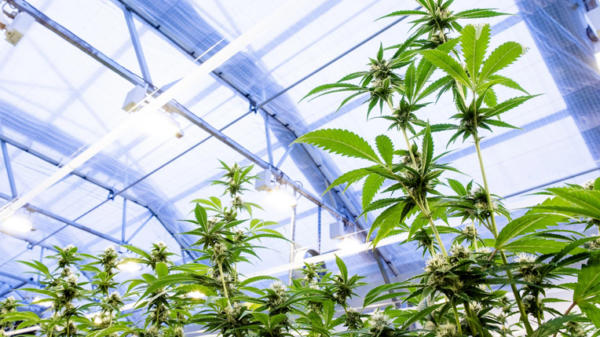In what advocates are calling a “historic hearing,” U.S. lawmakers gathered on Capitol Hill Wednesday to discuss how to put an end to federal cannabis prohibition.
Congress members debated what legalization reform should look like, and some talked about how to remove restrictions that hurt the cannabis industry—but one clear takeaway was members from both sides of the aisle agree the current laws need a major overhaul.
“Marijuana decriminalization may be one of the very few issues upon which bipartisan agreement can still be reached in this session,” said Republican Rep. Tom McClintock of California, adding “it ought to be crystal clear to everyone that our laws have not accomplished their goals.”
According to a recent CBS News poll, 65 per cent of Americans support legalization – and for the first time ever, a majority of Republican supporters are in favour of cannabis reform at 56 per cent.
Currently, 11 states have legalized adult use and 34 have approved medical marijuana programs, while a collection of bills are on the table in the House that would reform federal cannabis laws.
But the first-ever hearing was held Wednesday by the House Judiciary Subcommittee on crime and terrorism aiming to develop the best strategy on how to pass new cannabis legalization.
“There is a growing consensus in this country that current marijuana laws are not appropriate and we must consider reform,” said Rep. Karen Bass (D-CA). “Today’s hearing is a first step in that process.”
Industry gets its say
Although the meeting represented a major step forward for both advocates and the cannabis industry, there was no clear consensus on the best approach to change laws, whether its to remove cannabis from its Schedule 1 status, or to grant states the power to legalize on their own, or outright legalize it.
Neal Levine, CEO of Cannabis Trade Federation, was the Republican’s sole witness who supports the industry and broad cannabis reform, which was another positive sign for advocates.
For Levine, even an incremental approach to overhauling current federal laws will get momentum swaying in the right direction and help state-licensed cannabis business.
“The most immediate path to resolving the state-federal cannabis conflict is passage of the STATES Act,” Levine said, referring to a proposed bipartisan bill that would give states the right to set their own cannabis policies without concern of federal interference. “Immediate passage of the STATES Act could also help spur economic activity in disadvantaged areas in our country.”
Today, CTF CEO @NealLevine testified before Congress about the benefits of regulating #cannabis and the challenges associated with the conflict between state and federal laws. Check out his full testimony ➞ https://t.co/LfGUArAe1k #cannabisreform @JudiciaryGOP @HouseJudiciary pic.twitter.com/lrtJvo7W8f
— Cannabis Trade Federation (@CanTradeFed) July 10, 2019
“With strong bipartisan support for legislation like the STATES Act, it is possible during the current session of Congress to take major steps toward respecting state cannabis laws, protecting workers, and advancing a more secure, vibrant, and equitable cannabis industry,” he said. “We hope that Congress will take advantage of the opportunity.”
Aaron Smith, executive director of the National Cannabis Industry Association, mentioned how changes to federal law won’t only help the industry, but serve higher interests for the public as well.
He said states with legal markets are “successfully replacing criminal markets with well regulated businesses across the country and public support for ending prohibition continues to rise.”
“It’s long past time for Congress to align federal policies with modern state marijuana laws and public opinion by removing cannabis from the Controlled Substances Act so that we can begin the process of developing federal policies that will not only respect state laws, but will defend public health and safety, protect small businesses, and help repair the damage prohibition policies have inflicted on communities of colour,” Smith said.
Racial justice needed
The landmark hearing was titled “Marijuana Laws in America: Racial Justice and the Need for Reform,” and many spoke on how U.S. cannabis policy has harmed people of colour the most.
Congresswoman Bass said that since former president Richard Nixon began the War on Drugs, African Americans are 3.73 times more likely to face arrest for cannabis than white people.
Baltimore State’s Attorney Marilyn Mosby, whose office announced in January it would no longer prosecute cannabis possession, also testified before the panel.
“The data indicates that the disparate enforcement of marijuana laws and overall drug laws not only intensifies already existing racial disparities in the criminal justice system, but exacerbates distrust among communities and law enforcement without increasing overall public safety.”
https://twitter.com/BaltimoreSAO/status/1148969851693785090
Mobsey added she doesn’t support the STATES Act because it does not include social equity provisions nor deschedule cannabis.
“We have to go beyond decriminalization. We have to actually legalize this drug.”
Teamwork a key
Because the STATES Act is one of the most popular pieces of proposed legislation on the House floor, Rep. Matt Gaetz (R-FL) hopes the bipartisan bill can get enough support.
“My deep concern is that concerns over how far to go on some of the restorative elements of our policy could divide our movement,” Gaetz said. “If we further divide out the movement then I fear that we’ll continue to fall victim to that which has plagued other Congresses where we don’t get anything done.”
Levine argues passing the STATES Act wouldn’t just help the industry, but it “would actually clarify [cannabis reform] and focus the conversation” as Congress members work on wide-ranging legalization.
Looking forward
The fact the first-ever hearing occurred further illustrates how far cannabis has come in the last few years and shows it may be only a matter of when, not if, prohibition will end.
“Everything in politics seems impossible until it happens,” Rep. Ted Lieu (D-CA), said. “If 15 years ago I were to tell you, in 15 years we would have gay marriage in 50 states and, in some of those states, we’d be smoking weed, you’d think I was crazy—but that is in fact what is happening now.”
It's a huge waste of federal resources to criminalize #marijuana. It's time we remove it from the Controlled Substances Act! Today in @HouseJudiciary Committee, we discussed this and more. Watch here ⬇️ pic.twitter.com/HNZQe5f9Kf
— Rep. Ted Lieu (@RepTedLieu) July 11, 2019
When Lieu was in the California State Legislature, he was a major contributor to marijuana reform there. He said the whole federal system “seems irrational” especially considering how current laws are not based on science.
David Nathan, a physician with Doctors for Cannabis Regulation, agreed.
“As physicians, we believe that cannabis should never have been made illegal for consenting adults. It is less harmful to adults than alcohol and tobacco, and the prohibition has done far more damage to our society than the adult use of cannabis itself,” Nathan said in his testimony.
The hearing held July 10 could be the important step for the federal government to get out of the way of the states and actually change laws while the Democrats hold the majority of seats in the House. Cannabis reform will no doubt be a major boon to business, but also for veterans and communities of colour.
“This has been a historic hearing. I don’t think the Judiciary Committee has had a hearing on marijuana,” Rep. Steve Cohen (D-TN), said “I’ve been working on this issue for 40 years, and it’s just crazy that we don’t just get it all done.”
Yesterday @HouseJudiciary held a historic hearing on #Marijuana. I’ve been working on this issue for nearly 40 years. I understand why people want an incremental approach, but it’s been long enough. We need to de-schedule #Cannabis & expunge non-violent convictions. #LegalizeIt pic.twitter.com/FpRocZSp9k
— Steve Cohen (@RepCohen) July 11, 2019














